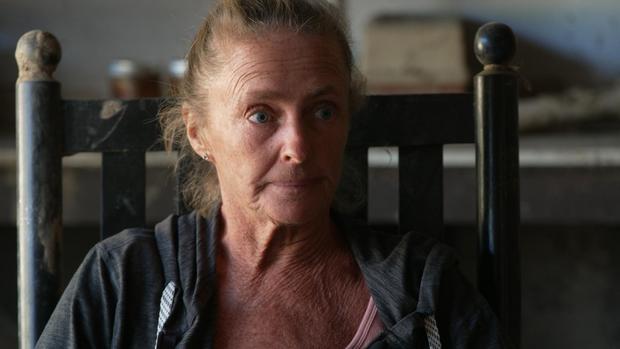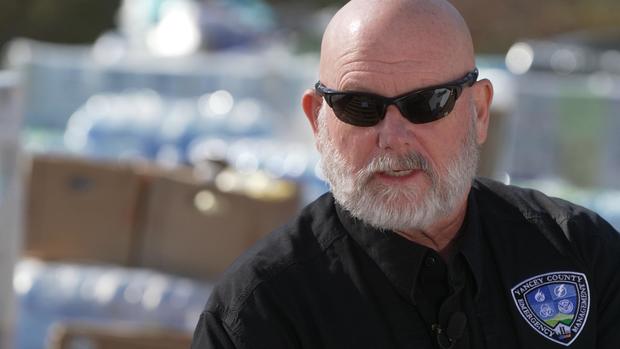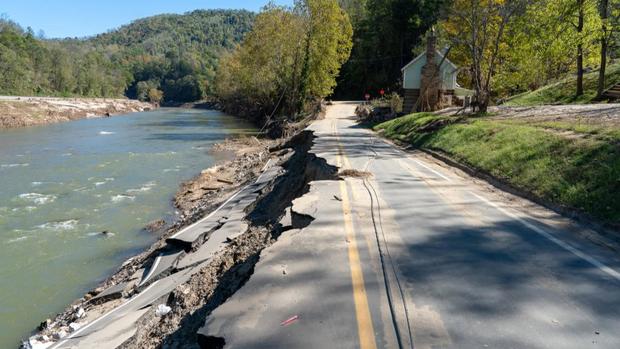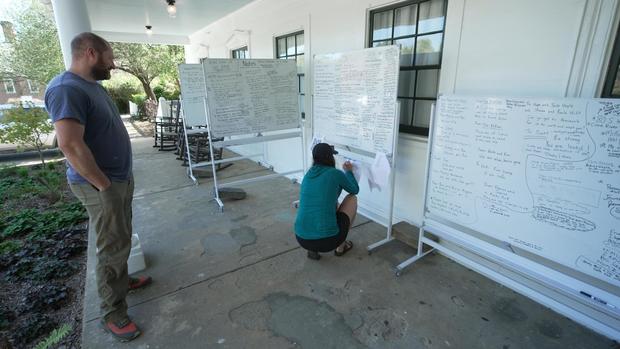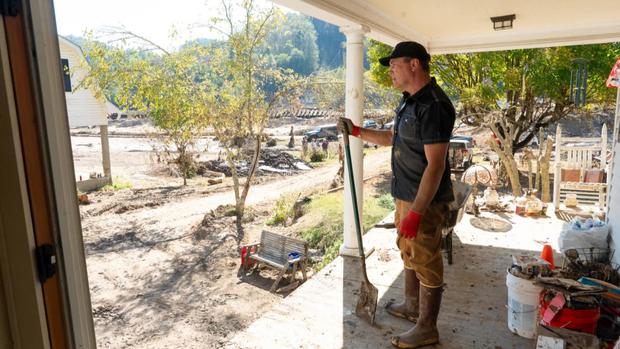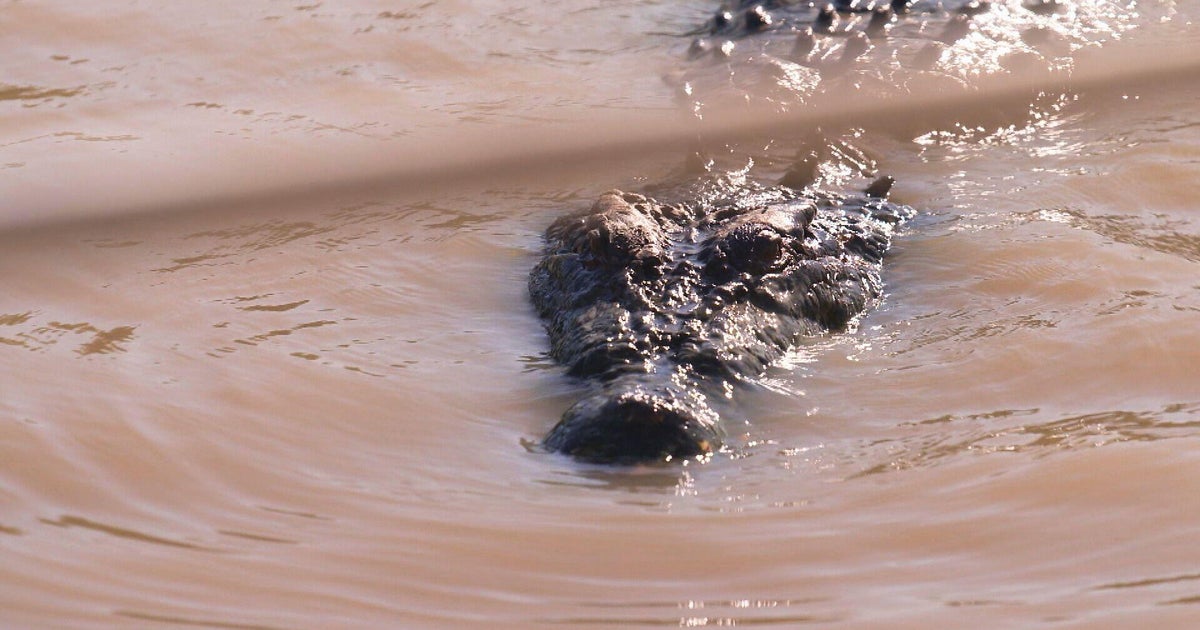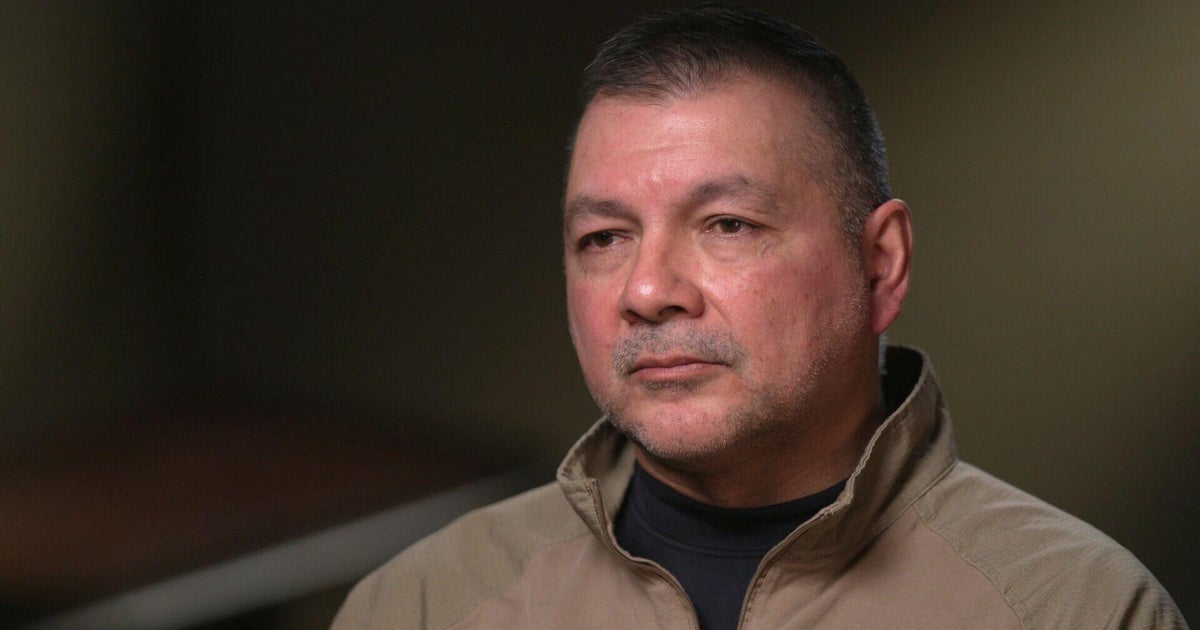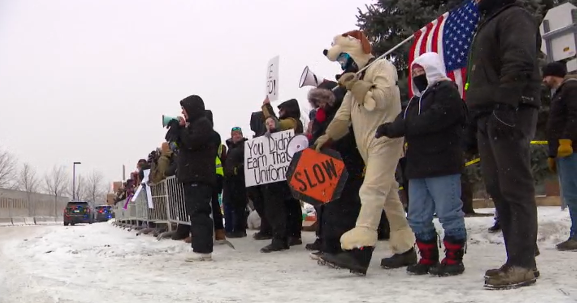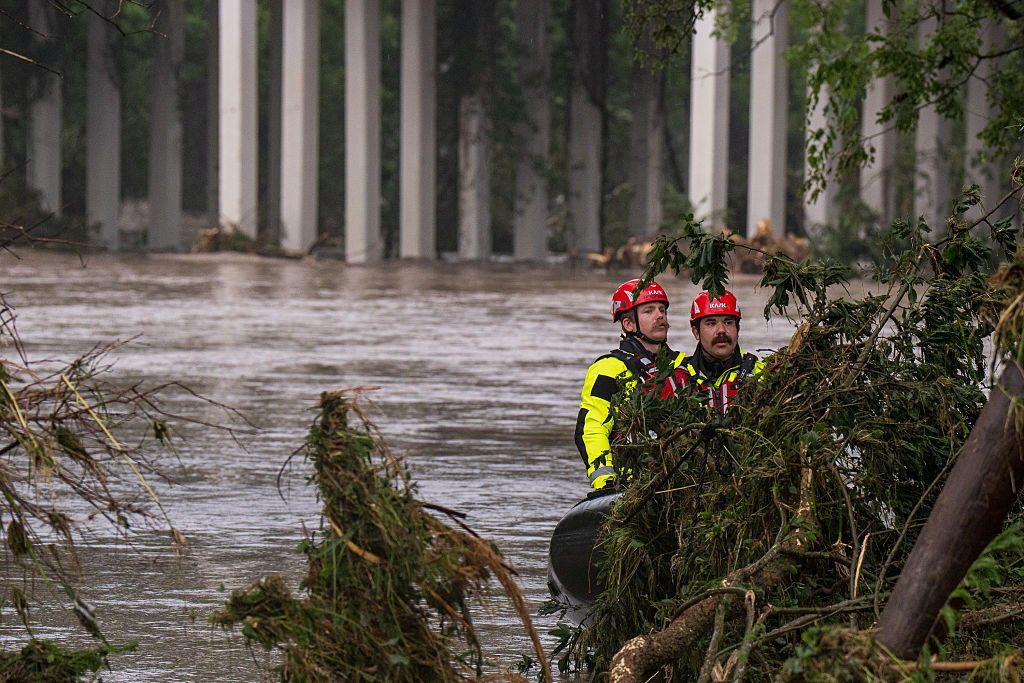Families in western North Carolina rebuild in the wake of Hurricane Helene: "This is home"
In Florida, residents are, once again beginning the slow process of recovery. Milton was the second hurricane to take aim at the state in as many weeks.
Just 13 days earlier, Hurricane Helene hit Florida, then carved a 500 mile path of destruction north…killing more than 240 people. The deadliest storm to strike the U.S. mainland since Hurricane Katrina.
One of the areas hardest hit was western North Carolina…a region unaccustomed to hurricanes. Residents were caught off guard when the Appalachian mountain range that hugs the border of Tennessee acted like a funnel for the remnants of Helene… devastating the communities below.
Tonight, you will hear from survivors and about the enormous effort to bring relief to North Carolina.
With the force of a tidal wave, water tore down the Appalachian Mountains, knocked over bridges and sent homes and people downstream.
We made our way… 45 miles north of Asheville… snaking around the washed out roads and into the communities Helene tried to wipe off the mountain.
Two thousand feet up, we saw what is left of Green Mountain. A town tucked above the gurgling North Toe River until the remnants of Helene came roaring down the mountain with enough power to snap their concrete bridge in half.
Jane Whitson Peterson: It sounded like you was at the ocean. And it looked like the ocean except it was dirtier, muddier.
Sharyn Alfonsi: Was there stuff in it?
Jane Whitson Peterson: We saw a house float down.
Sharyn Alfonsi: In front of here?
Jane Whitson Peterson: Yes. That way. If you've never been through it, somethin' I never want to see again. And I hope and pray nobody has to.
Jane Whitson Peterson, her husband and 96-year-old mother, were trapped inside the general store the family has run for more than 60 years.
She took this video from the second floor.
Jane Whitson Peterson: We have-- two doors down that way outside. And then we have this back one. And we tried to block 'em. And you don't stop water. And it busted through the back door. And then it started comin' in the front door. And--
Sharyn Alfonsi: So the water's coming through the store--
Jane Whitson Peterson: It come three different ways. So when we got up there and we stood on the steps and watched it come in. And all we could do is just sit and watch it and pray that it didn't get no higher.
Jane Whitson Peterson: It came up to the… 1, 2, 3, 4, 5, 6, 7th step.
This is what those answered prayers look like today. Only the skeleton of the family's store is left. Her father's old cash register is clogged with mud and her mother's home was destroyed.
Jane Whitson Peterson:. She's 96. She's raised seven kids and worked 16, 18 hours a day. It's really hard for her. But my mom got up the next mornin' singin'.
Sharyn Alfonsi: Singing?
Jane Whitson Peterson: Singin'.
A hymn about the expectations of a home in heaven. On her front lawn, 96-year-old Parzady Whitson shared it with us, surrounded by what's left of her home on Green Mountain.
For so many, this was their slice of heaven. Living in "the Hollers"...the communities built in the valleys of the Appalachian mountains.
Sharyn Alfonsi: What do you do next as a family?
Jane Whitson Peterson: We keep goin'. It's what we've always done. I've not been a whole lotta places. But-- I would never go nowhere else to live. Everybody knows everybody. And if you need a hand, we're there. We'll do anything we can to help you.
Sharyn Alfonsi: This is home.
Jane Whitson Peterson: This is home.
Jeff Howell: I call it God's country. I know everybody says that because where they live. But-- this-- this little piece of west North Carolina is just the-- the mountains are just-- th-- they're magical.
Jeff Howell's family has lived in the area for seven generations. Howell is the emergency management coordinator for Yancey County… an area that was hit hard by Helene.
The devastation caught most residents by surprise. Western North Carolina hasn't seen anything like this since the Great Flood of 1916… when two storms converged and pushed rivers over their banks.
Forecasters say this time…the stage was set for disaster well before Helene roared in.
Days earlier, a weather front stalled over the mountains. Some areas got more than a foot of rain.
When Helene arrived… these mountains were already saturated. There'd been three days of rain. Creeks and streams rerouted and grew bigger and stronger. There was nowhere for all of that water to go but down…And it took everything in its path with it.
Jeff Howell: We started getting the entrapments-- the landslide calls. And the-- the most worrisome thing about it is when the calls stopped, because we had no radio communication. We had no cell phone. We had no internet. You couldn't talk to anyone. And it was-- that was terrifying.
45 miles to the south, Asheville, which sits in a valley of the Blue Ridge Mountains , acted as a catch basin for the water that funneled down the Appalachians…triggering landslides along the way.
The two rivers that intersect with the city swelled to the highest levels in history. The water was so strong it pushed homes off their foundations… and lifted a 10,000 pound tractor trailer into the treetops.
Rescue crews wound through the city on boats.
Radios, cellphones and the internet were knocked out.
Up in Yancey County… they couldn't call for help or wait for it.
Jeff Howell: We basically just abandoned the-- the emergency operations center and the sheriff's department, they were already out doing rescues. But we would just go in. "Give me another name." And we'd take off and-- and try to find these people and get them.
A local firefighter and his wife were among those rescued.
Jeff Howell: He and his wife were asleep in their house when the flood washed it off the foundation and they were floating down where the river became. And it shoved them through the wall of their house. They hung on to a tree for two or three hours until they were found. But then the next day, he was at work. His face was scratched all to pieces, bandaged up. But that's the kind of people we have.
More than 70 search and rescue teams from across the country were dispatched to North Carolina. Locals helped guide them up the treacherous mountain terrain to look for survivors.
Forest rangers and paramedics carried a man, who broke his back in a landslide, three miles down a steep slope in the dark.
In the week after the storm, hundreds of people were reported missing. Some families couldn't reach their loved ones for days. Others couldn't reach them at all.
Desperate to connect, some people posted messages on the porch outside the hotel NuWray… a cornerstone of the county for nearly 200 years. Boards filled with the names of the missing… and heartbreaking updates.
We are alive. House gone.
The NuWray has been feeding hundreds of weary storm victims warm meals every day.
Donations and relief workers have poured in.
FEMA set up more than 40 processing centers and says, so far, it has distributed more than $100 million to North Carolina victims.
Aid is arriving by helicopters, even mules… carrying loads of medicine to areas trucks couldn't reach.
More than 500 roads remain closed and more than 100 bridges need to be replaced. A patchwork of dusty routes now holds the region together.
Jeff Howell, who fought with the U.S. Army in Afghanistan and Iraq…is now trying to get help to his neighbors.
Jeff Howell: You hear the phrase "you can't get there from here." We have a lot of that. Part of the community is-- it's cut off and they have to actually go around through Tennessee to get here. Sixty miles one way.
Sharyn Alfonsi: Did your time in the Reserves prepare you for this?
Jeff Howell: It did. It's-- it's unlike combat stress because in combat, you can shoot back. I can't do anything. And that's very frustrating. But what I can do is, you know, working with the people around here and-- keep the miscommunications down is the best thing (laugh) I can do right now. But that's-- that's a struggle in itself.
Jeff Howell is now dealing with a storm of dis-information.
He told us conspiracy theories and false claims about the government's response to the flood… have also made their way to the top of the mountain.
Jeff Howell: I don't even know how they make it up. You know? Stories about FEMA seizing trailers and draining tankers and we're going, 'That's just – that is really not happening.'
Sharyn Alfonsi: How does that impact workers on the ground?
Jeff Howell: It takes their focus away from what they're supposed to be doing when they're having to-- debunk this sort of stuff and explain to people, "No. The U.S. government did not geoengineer this storm. But like I said, some people, they're gonna believe it no matter what.
The day after we spoke to Howell, a neighboring county was investigating reports of an armed militia quote "hunting FEMA."
One arrest was made. FEMA suspended door to door operations in western North Carolina for 48 hours.
But the agency reports all operations have resumed.
This is one of the areas still in need of help. a place curiously…called Relief.
James Warrick: This is the old post office
Sharyn Alfonsi: You used to play in here?
James Warrick: We did.
James Warrick told us the area was named after a medicine the town doctor sold in the 1800s… that provided relief to its patrons. The main ingredient was alcohol.
Warrick and his mother Jewel have lived in that same doctor's house for the past 55 years. Today, it is buried in mud.
Less than 1% of residents in the hardest hit areas of western North Carolina have flood insurance.
Sharyn Alfonsi: What was it like before?
Jewel Warrick: Life was wonderful. It was wonderful.
James and Jewel evacuated days before the storm and say they encouraged their neighbors to leave as well. But by the time they tried it was too late.
James Warrick: There was a wall of water that came down the river that engulfed this area. And it's probably the same wall of water that took our neighbors with it. So we are the only two surviving people here in Relief. Six of our neighbors have-- have-- have died.
That – is what's left of the car the couple next door – and her two young boys – tried to escape in. It was crushed by water so powerful…it twisted the train tracks in town.
More than three weeks after the storm, crews are still searching the debris along the rivers. In North Carolina, at least 125 people were killed by Helene. More than 50 are still missing.
Across the Appalachian Mountains, the road to relief will be a long one.
Jewel Warrick: I'm still in shock. I mean I carry on. I laugh, and I joke, I take my times even when I cry, but I've not really let loose. But I have a strong family and we have a strong community and we're all pulling together.
Sharyn Alfonsi: You'll stay here?
James Warrick: I think so. This is Mom's home.
Jewel Warrick: Yeah. It's my family's home, the girls and James and the grandchildren, great-grand[children]…yeah. We'll survive. You know. It's not giving up. We can't. There's hope. And when you have hope, you move on.
Donations to support those affected by Hurricane Helene can be made to:
Mitchell County, North Carolina
Produced by Ashley Velie. Associate producer, Eliza Costas. Broadcast associate, Erin DuCharme. Edited by Michael Mongulla.

